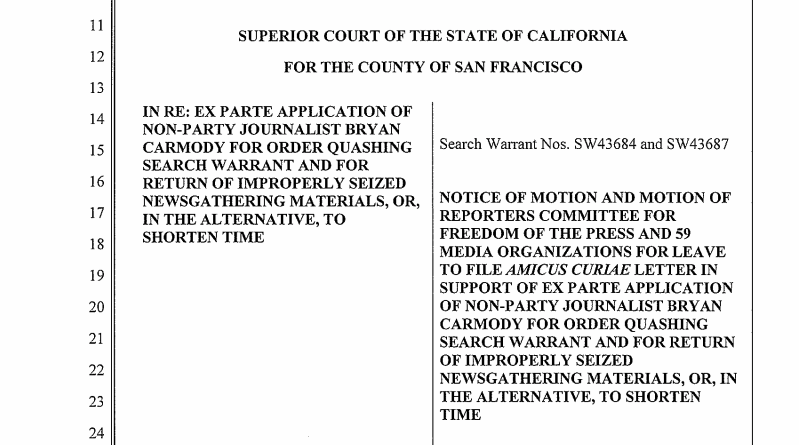60 media organizations urge return of San Francisco journalist’s seized materials

Update 7/23/19: The 11-page warrant San Francisco police used to seize Bryan Carmody’s phone records in May was ordered unsealed on July 18. View the warrant that was sent to Carmody, the Reporters Committee, SPJ NorCal and the First Amendment Coalition today. Follow the Reporters Committee for more updates on this case.
Sixty media organizations, led by the Reporters Committee for Freedom of the Press, are urging a California court to order the immediate return of San Francisco journalist Bryan Carmody’s protected work product, documentary materials and newsgathering equipment that were seized last week by San Francisco police.
In a letter supporting Carmody’s motion — which the court agreed to accept for filing today during a hearing — Reporters Committee attorneys argue that search warrants directed at members of the news media present a particularly potent threat to newsgathering and reporting.
“Law enforcement use of tools like search warrants to chill the disclosure of newsworthy information demands that courts rigorously enforce existing legal protections for journalists’ work product and documentary materials,” reads the letter, which was joined by 19 California news media organizations as well as dozens of national news media outlets. “These protections are vital to journalists’ ability to effectively gather and report news of importance to the public.”
The California Constitution and California statutory law clearly prohibit the use of search warrants to seize journalist’s notes and other materials, and California law also expressly provides that journalists may seek the return of items seized in violation of the law.
Reporters Committee attorneys also noted federal involvement in Carmody’s case. As detailed in Carmody’s application to recover his material and equipment, FBI agents were present during the search and asked him to identify his source for the police report. Internal Justice Department news media guidelines restrain the use of search warrants against the press and require attorney general approval before reporters can be questioned about their newsgathering activities.
“It will be essential to determine if those guidelines were followed in this case, given the FBI interviewed Mr. Carmody during the search,” said Gabe Rottman, Reporters Committee Technology and Press Freedom Project Director, in a statement.
Additionally, the Reporters Committee, First Amendment Coalition and the NorCal chapter of the Society of Professional Journalists filed a separate motion on May 16 to unseal all search and arrest warrants, probable cause statements submitted to the court to support the issuance of those warrants and lists of the inventory seized from Carmody by San Francisco police.
California law expressly requires that these “search warrant materials ‘shall be open to the public as a judicial record’” and no justification exists for maintaining them under seal, argued Duffy Carolan of the law firm of Jassy Vick Carolan, who is representing the media coalition in the suit.
“Because this case implicates no defendant’s fair-trial rights, or prosecutorial interests sufficient to outweigh the public’s right of access, the warrant materials should be unsealed,” she stated in the motion.
“Multiple aspects of this case are incredibly concerning — from the issuance of the search warrants targeting Mr. Carmody’s home and office apparently due to his refusal to disclose a confidential source, to the search and seizure of his newsgathering materials and equipment,” said Reporters Committee Legal Director Katie Townsend. “California and federal law protect journalists’ work product from seizure by the government, and it is essential for the public to know law enforcement’s argument for doing so in this case. That’s why we filed a letter supporting the return of items seized and a motion to unseal the underlying warrant materials that authorized the searches.”
Read the coalition’s letter. View the motion to unseal.